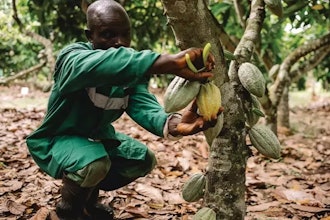BUENOS AIRES, Argentina (AP) — Monsanto Co. is calling for more controls on agrochemicals, including its Roundup line of glyphosate-based weed-killers, in response to an Associated Press report about concerns that illegal pesticide applications are harming human health in Argentina.
"If pesticides are being misused in Argentina, then it is in everyone's best interests - the public, the government, farmers, industry, and Monsanto - that the misuse be stopped," the St. Louis, Missouri-based company said after the AP report was published Monday.
The company criticized the AP report as lacking in specifics about health impacts, though the story cited hospital birth records, court records, peer-reviewed studies, continuing epidemiological surveys, pesticide industry and government data, and a comprehensive audit of agrochemical use in 2008-11 prepared by Argentina's bipartisan Auditor General's Office.
Argentine doctors interviewed by the AP said their caseloads — not laboratory experiments — show an apparent correlation between the arrival of intensive industrial agriculture and rising rates of cancer and birth defects in rural communities, and they're calling for broader, longer-term studies to rule out agrochemical exposure as a cause of these and other illnesses.
Asked for Monsanto's position on this, company spokesman Thomas Helscher told the AP in an email Tuesday that "the absence of reliable data makes it very difficult to establish trends in disease incidence and even more difficult to establish causal relationships. To our knowledge there are no established causal relationships."
Earlier, Monsanto criticized the AP report as "overbroad in indicting all 'pesticides' when we know that glyphosate is safe."
"The U.S. EPA and other agencies not only say there is no evidence of carcinogenicity but go further to give it the highest rating, "E," which means there is affirmative evidence that glyphosate does not cause cancer in humans."
This claim of safety is part of the problem, Monsanto's critics say. While glyphosate is less toxic in terms of acute exposure than many other herbicides, insecticides and fungicides, it is routinely blended with other chemicals when applied to crops. The spray that drifts from fields and seeps into groundwater adds to an overall chemical burden, a mix of many individual ingredients.
In 1996, Monsanto paid a $50,000 fine and agreed to "cease and desist" promoting glyphosate as "safe" after New York's attorney general sued it for false advertising.
Monsanto acknowledged then that EPA approval "is not an assurance or finding of safety" because U.S. regulations are based on a cost-benefit analysis, which balances the potential of "any unreasonable risk to man or the environment" against the "the economic, social, and environmental costs and benefits of the use of any pesticide."
Argentine federal law follows a different standard. It says that when "faced with the possibility of serious and irreversible harm," the users of a chemical must make sure they protect human health and the environment, even when there's "a lack of information or scientific certainty," and "no matter the costs and consequences."
Asked which standard Monsanto should follow in Argentina, the company spokesman said it follows all applicable regulations all over the world.
"It is not for Monsanto to decide or give opinion about the legal principles that rule the regulations of the country. Monsanto is respectful of the Argentine legal and regulatory framework, and will comply with the principles Argentine authorities decide," Helscher wrote Friday in response to questions from the AP.
Agriculture Secretary Lorenzo Basso did not respond to requests for comment sent to his office, his secretary and his biotechnology deputy.
Dr. Damian Verzenassi runs a continuing epidemiological study at the National University of Rosario Medical School that has found a 90 percent increase in cancer rates since 1997.
"They said this new system of production would diminish agrochemical use in the country. They called the arrival of GMOs a second green revolution," he said Tuesday.
Helscher acknowledged to the AP that agrochemical use has not decreased and in fact has grown beyond what would be required by the dramatic expansion of farming in Argentina alone.
The country's "agricultural production has tripled in the last 20 years, going from around 35 to just about 100 million tons that are currently produced. In the same period, the agrochemical application per produced ton grew at a dramatically lower pace of 2.85 to 3.2 liters according to the figures of the agrochemical industry," Helscher wrote.
The AP report cited data from CASAFE, Argentina's pesticide industry chamber, showing a ninefold increase in the overall amount of formulated agrochemicals sold annually, from 9 million gallons (34 million liters) in 1990 to more than 84 million gallons (317 million liters) in 2012.
Agrochemical use declined at first, then jumped after 100 percent of Argentina's soy came from genetically modified plants and farmers stopped tilling the soil to kill weeds. As resistant pests exploded, farmers found themselves with little choice but to mix in much more toxic chemicals.
"It's an integral chemical compound — it has glyphosate, it has surfactant (to facilitate its dispersion), and on top of that they blend in 2,4,D (a hormonal weed-killer), endosulfan (an insecticide) and other agrotoxins," Verzenassi said.
Helscher told the AP that "scientists do see a tendency for higher probability for resistance to evolve in these situations especially when there is sole reliance on a single herbicide for the management of the key weed species." The answer, he said, is using "the appropriate combination of multiple herbicides."
Dave Schubert, who runs the cellular neurobiology laboratory at the Salk Institute in La Jolla, California, disagrees. "People worry about genetic modification, but with herbicide resistant crops, perhaps the biggest health risk is the huge amount of herbicides currently being used," he said Tuesday.
Schubert's study of the shortcomings in the U.S. pesticide approval process, published in Biotechnology and Genetic Engineering Reviews in 2004, concluded that more rigorous testing by the EPA and the Food and Drug Administration is necessary, since so many other nations cite U.S. reviews for their own approvals.
"All of this stuff should be fed to pregnant animals to look for birth defects, and feeding studies should be done for at least a year to determine potential long-term toxicities," Schubert told the AP.
Monsanto said it would keep urging farmers to follow the rules. That hasn't happened in Argentina, where no one was punished for violating federal spraying rules from 2008 to 2011, the auditor general found.
"We deplore the misuse of any pesticides, regardless of who makes them. Monsanto's employees work very hard to ensure that our customers and suppliers are properly trained and use the products according to label instructions, and that applies to Argentina, the United States, and everywhere else we do business," the company said.
Given ample evidence of poor enforcement and growing complaints of human health impacts 17 years after Argentina accepted this farming system, Monsanto should do more, said Judy Hatcher, chairwoman of Pesticide Action Network International.
"Argentina was an early adopter of genetically engineered seed technology," she wrote in an email to the AP. "As we've also learned in the United States, herbicide-resistant GE crops lead to dramatically increased pesticide use. And as weeds develop resistance to these chemicals, industry rolls out even more hazardous chemicals to battle the 'superweeds. Farmers get trapped on the pesticide treadmill."






















